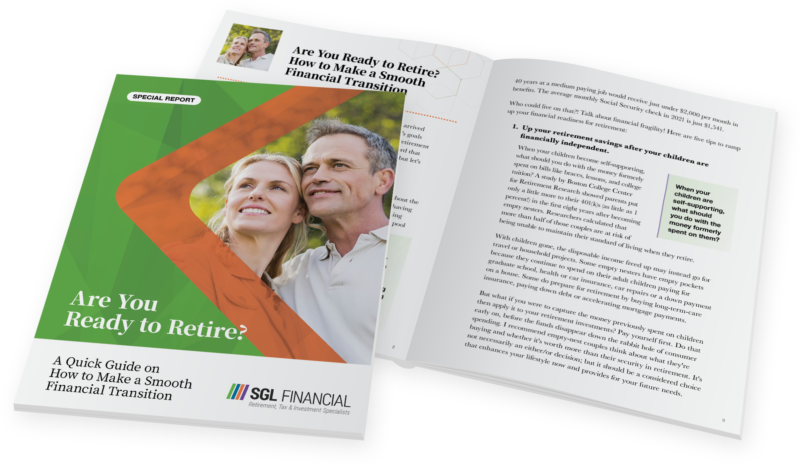Harmonizing Your Future: The Art of Retirement Planning as a Couple
by Gabriel Lewit

Retirement used to produce images of old people sitting in rocking chairs with limited activities and interests, but not today. Fortunately, more recent retirees are much more active because retirement may last well into their 90’s. If you and your spouse/partner are nearing retirement, it’s important that you jointly decide what your retirement will look like because it is likely to span decades due to healthier lifestyles and advances in the medical sciences.
Open, honest communications with your spouse or partner about how you envision retirement is the first step. The two of you should be willing to discuss, compromise, and resolve important issues that may impact your retirement plan.
For instance, if one of you envisions staying closer to home once retired to be with family and friends, but the other is interested in a second home in Arizona, you have an important issue that should be resolved with open communications. The same goes for your lifestyle, financial security later in life, and estate planning to distribute your assets. You don’t want to make these types of decisions without open communication.
This is where the services of a Buffalo Grove CFP® professional can be integrated into your retirement planning efforts. They can assist you in identifying your financial priorities and goals and then build a retirement plan that helps you pursue them. Think of a team of expert planners as your financial guides, helping you determine destinations and stay on the right track.
Read our latest guide: Navigating Market Volatility: The Power of Long-Term Investing
Will We Have Enough Money to Last Through Retirement?
Financial security, especially late in life, is a major concern for most people. Who knows what the future will bring? The most common concern we hear from people approaching retirement is: “Will I have enough money to cover all my costs in my late retirement years?”
This worry stems from many uncertainties about future expenses, persistent inflation, healthcare costs, market volatility, and the potential for spending principal so it is no longer available to produce retirement income.
Addressing this fear requires a unified approach for you and your spouse/partner as you approach retirement. You should share your retirement lifestyle expectations, review your income sources, determine expenses, and identify any other concerns you may have.
Listen to our podcast: “Strategies to Pay Zero Taxes on Social Security.”
The Importance of a Comprehensive Retirement Plan
Once you and your partner have a communication plan and are on the same page about planning for your retirement strategy, the next step is to create a plan that addresses several factors that you’ll need to determine after you retire:
A comprehensive retirement plan should include:
- Income Planning: This involves understanding your retirement income sources, such as pension plans, IRAs, Social Security benefits, and income from investment accounts. It’s about planning how to structure these sources of income to support your lifestyle during all of your retirement years.
- Budget and Cost Analysis: This includes a thorough analysis of your expenses, including:
- Housing expenses
- Utilities
- Healthcare costs
- Food and groceries
- Transportation
- Personal expenses
- Leisure and entertainment
- Debts and loans
- Insurance
- Taxes
- Investment Management: This refers to the ongoing process of managing your investment portfolio to balance growth and risk, considering your retirement timeline, capacity for taking risks, and long-term financial goals.
- Tax Planning: This component focuses on strategies to minimize tax liabilities on retirement income, ensuring more of your money is available for your current and future use.
- Healthcare Planning: Considering the potential for rapidly increasing healthcare costs in retirement, this includes estimating those expenses and planning for long-term care insurance if needed.
- Estate Planning: This involves setting up legal structures like wills, trusts, and powers of attorney to ensure your assets are distributed according to your wishes and that decisions can be made on your behalf if you cannot do so.
Running out of money in retirement? Your financial roadmap awaits!
When Will Each of You Start Taking Social Security Benefits?
Deciding when to start Social Security benefits is another important decision you and your spouse/partner should discuss, as it can significantly impact your retirement income. Taking benefits at the earliest age of 62 may result in a permanently reduced payment, while delaying benefits beyond your full retirement age (FRA) of 67, up to age 70, can increase your monthly benefit.
Claiming Your Benefits Before 67
- Starting benefits before FRA reduces your monthly payments, which could be critical if your investment returns or other income sources don’t cover all of your expenses.
- Early benefits might be necessary for immediate financial needs or health concerns, but this choice reduces your lifetime income potential.
- Claiming early may also mean more of your income needs are met, allowing your investments to remain untouched and continue to grow over time.
Full Retirement Age Benefits (67):
- Claiming your benefits at FRA increases your income for the rest of your life.
- This option may be right if you and your spouse/partner can comfortably manage expenses without needing Social Security distributions before age 67.
Delaying Benefits 67+ to 70:
- Delaying benefits past FRA increases your monthly benefit by 8% each year. You can delay it until 70 when you must begin taking benefits. This allows you and your spouse to maximize your retirement income, which could be useful later in life.
- This is similar to earning an 8% return on your investments without the normal volatility one can expect from the securities markets.
- Higher benefits can also mean higher taxable income. Social Security income may be taxed based on your combined income levels, which includes your adjusted gross income, nontaxable interest, and half of your Social Security benefits.
- Be sure you understand the tax implications of your combined retirement incomes, including your Social Security benefits. Delaying benefits might push you into a higher tax bracket or increase the portion of Social Security benefits subject to taxes.
Watch our co-founder, Steve Lewit, on WGN 9 News-Preparing for the Unexpected.
Retirement Planning for Couples
At SGL Financial, we have developed “The Four Pillar Retirement Plan,” focusing on four critical areas for a fulfilling retirement: Income, investments, taxes, and legacy.
Whether you’re seeking strategies for tax-efficient investing or the expertise of a retirement planning specialist to design your financial roadmap, using the four pillars can be a game changer when you plan for your future.
Here’s how it works:
Pillar 1: Maintaining a steady income during retirement is crucial. We’ll show you how to leverage your assets, maximize Social Security benefits, and build a buffer for unexpected costs.
Pillar 2: Your investments should align with your risk tolerance, your time horizon, and your goals. Regularly reviewing your investments is key to maintaining a properly allocated portfolio.
Pillar 3: Nobody enjoys paying unnecessary taxes. We’ll help you devise a tax strategy that ensures your assets are managed in tax-efficient accounts that adapt to current market conditions and changes in your lifestyle.
Pillar 4: Legacy planning is more than asset distribution—it’s also about passing on values and memories. Our team helps you formulate a plan, ensuring your legacy is exactly how you want it to be.
If you and your spouse/partner are ready to explore comprehensive retirement planning, we invite you to connect with us to schedule an introductory meeting.

